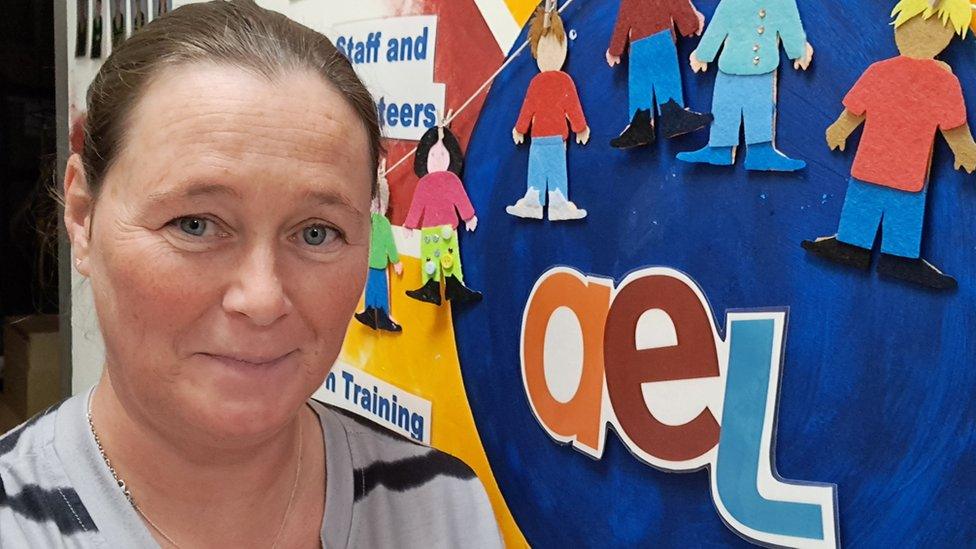EU funds: 'Bleak time until money is fully replaced'
- Published

Lorraine Black said her organisation was looking at a £200,000 deficit without the funding in place
The UK may have officially left the European Union in 2020 but Brexit is still making headlines.
And for some community organisations in Northern Ireland, it has left them in funding limbo.
The European Social Fund, which is aimed at helping people who have difficulties finding work, will no longer be available to the UK from March 2023.
While the UK government has promised to fill the void left by the removal of EU structural funds through the UK Shared Prosperity Fund (UKSPF) by 2024, there is still a great deal of uncertainty.
Some groups are concerned they will no longer qualify for the funding, while others are not sure the money will be enough.
'Lifeline for families'
One of the groups reliant on ESF money is Larne-based Access Employment Limited (AEL), which provides opportunities for people with disabilities to gain work experience and training.
It runs a number of social enterprises - businesses whose primary purpose is to address need rather than create profit.
One of them involves repackaging goods from around the world and selling them online. There's also a cafe and a garden centre for trainees to learn new skills.
Lorraine Black, who is head of services at AEL, said it was a "bleak time".
She said they were looking at a £200,000 deficit without the funding in place and this would mean they could help fewer people and staff would lose their jobs.
They have been able to take on 175 trainees in the last seven years, since the ESF funding has been in place.
Ms Black says they offer five hours a day, five days a week and the service is a lifeline for families.
"It impacts their families, who rely on AEL as a form of respite," she said.
"There is not enough capacity within existing statutory services to replace the loss of current ESF programmes, and this means individuals are being denied access to support services that enable them to make informed choices about their day-to-day lives and help them reach their full potential within their communities."

Daniel Johnston, who is on one of AEL's programmes, said he had gained new skills and new friends.
"If I wasn't coming here, I would remain unemployed," he said. "I wouldn't be able to get work without the support AEL."
Julie Steele is operations director of the Advantage Foundation, which runs a project called Quest.
It provides training to young offenders, who complete a qualification in employability and gain work experience in the foundation's social enterprise Mugshots, a print shop which puts designs on T-shirts and other merchandise.
She said Quest, which aims to reduce reoffending rates, was 65% ESF-funded and 35% Department of Justice-funded.
"The loss of ESF funding and the need to replace it with, as a minimum, the same level of resourcing, is a critical issue," she said.
"ESF-funded projects work hard to ensure they have positive outcomes not only for the service users but also for the wider community."

Stormont used to match fund the EU money
Northern Ireland's politicians and a consortium of community groups have been urging the government to fully replace the lost funding.
The ESF had previously provided about £40m a year, which was 35% match-funded from Stormont, giving £54m in total.
Next year experts are anticipating about £30m from the UK Shared Prosperity Fund, but no match funding has been confirmed from Stormont yet.
Stormont's Finance Minister Conor Murphy said it had been a straightforward arrangement when the departments were operating the ESF themselves, directing support to groups who need it and match funding it.
"That arrangement doesn't exist any more, so it has left us in a huge degree of limbo," he told the BBC.
Economy Minister Gordon Lyons told the BBC the funding issue was not an inevitable consequence of Brexit but a case of the UK government not keeping its word.
"It's OK to admit when you have got it wrong," he said. "The government needs to recognise they have not fulfilled their promises and they need to change course."
'Positive meeting'
The ESF Peer Group, an umbrella body for a number of groups, said it had been working for more than a year with officials from Westminster and Stormont departments to find an adequate funding package to replace the ESF.
"Unless we find a solution, the 22 community groups we represent will be unable to continue supporting some 18,000 of the most vulnerable in our society or provide security of employment for their 1,700 staff," it said.
The group added it had a positive meeting with officials from the Department for Levelling Up and the Northern Ireland Civil Service on 14 October.
"The issues which remain to be addressed are around compliance with equality legislation and how the limited Shared Prosperity Funding might be added to from Northern Ireland budgets," it continued.
A government spokesperson said: "Northern Ireland is benefiting from £49m through the first round of our Levelling Up Fund, and the fund's second round will provide further investment to help empower communities to drive change.
"This is on top of £127m allocation from the UK Shared Prosperity Fund, that will help those most vulnerable and furthest away from the labour market to secure sustainable employment, alongside other priorities.
"Over the summer, officials have engaged widely with partners to seek views on priorities for UKSPF in Northern Ireland and develop an investment plan.
"This work will conclude shortly and will then move to the implementation phase, including funding opportunities for delivery in 2023-24."
Related topics
- Published12 January 2022

- Published12 October 2022

- Published13 October 2022
